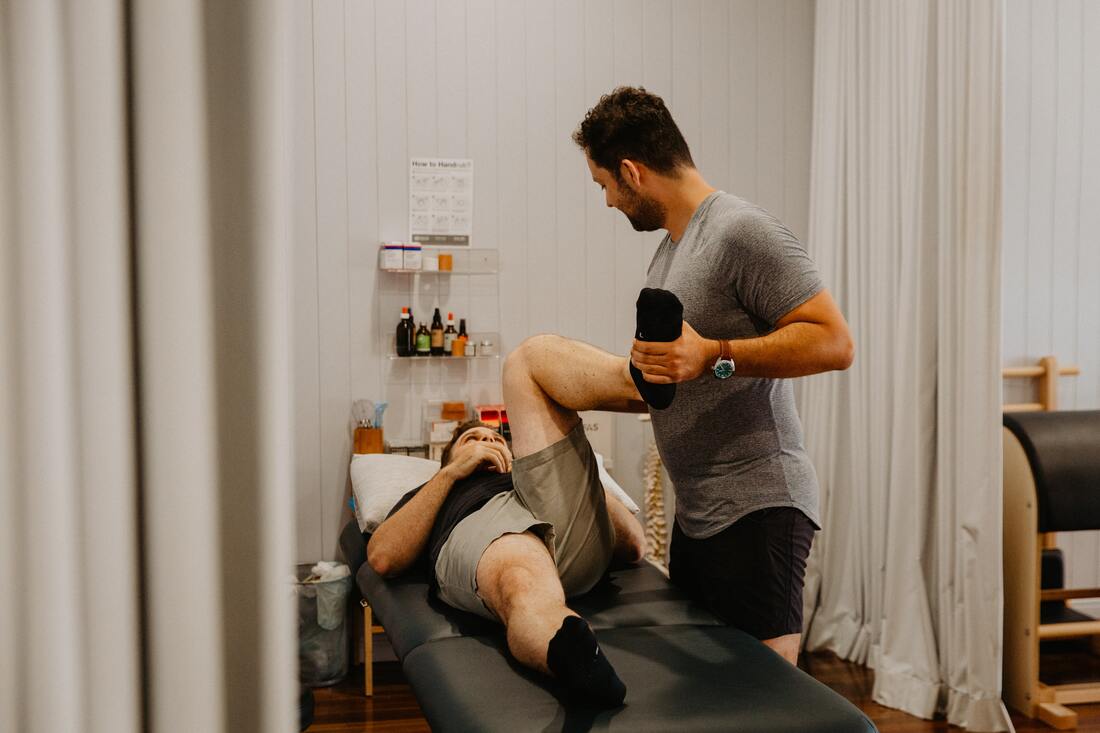Peripheral Neuropathy physiotherapy Brisbane southside.
What is Peripheral Neuropathy?
Peripheral neuropathy refers to a group of disorders that involve damage to the peripheral nerves – the intricate network of nerve fibres that are responsible for transmitting signals between the central nervous system (brain and spinal cord) and the rest of the body, including the limbs, organs, and muscles. When these nerves are damaged, the signal disruption can lead to a variety of symptoms: weakness, numbness, and pain, typically in the hands and feet.
What are the causes of Peripheral Neuropathy?
Peripheral neuropathy can have various causes, including:
What are the symptoms of Peripheral Neuropathy?
The symptoms of peripheral neuropathy can vary widely and commonly include:
How is Peripheral Neuropathy diagnosed?
Diagnosing peripheral neuropathy typically involves a combination of medical history, physical examination, and various tests, such as nerve conduction studies or electromyography (EMG). Identifying the underlying cause is crucial for effective management.
What is the treatment for Peripheral Neuropathy?
Treatment options for peripheral neuropathy include:
How can physiotherapy help after Peripheral Neuropathy diagnosis?
Physiotherapy can be a valuable component of the management and rehabilitation process for individuals diagnosed with peripheral neuropathy. It can help improve functional abilities, alleviate pain, enhance mobility, and maintain or restore overall quality of life. Here are several ways in which physiotherapy can assist individuals with peripheral neuropathy:
It's important that treatment plans should be personalised to address the specific symptoms and needs of each individual. Additionally, physiotherapy should be integrated into a comprehensive care plan that may involve medical management of the underlying condition causing the neuropathy, such as diabetes or autoimmune disorders.
If you or a loved one has questions about Peripheral Neuropathy and how our physiotherapists might be able to help please call us on 07 3706 3407 or email [email protected]. We would love to work with you!
Peripheral neuropathy refers to a group of disorders that involve damage to the peripheral nerves – the intricate network of nerve fibres that are responsible for transmitting signals between the central nervous system (brain and spinal cord) and the rest of the body, including the limbs, organs, and muscles. When these nerves are damaged, the signal disruption can lead to a variety of symptoms: weakness, numbness, and pain, typically in the hands and feet.
What are the causes of Peripheral Neuropathy?
Peripheral neuropathy can have various causes, including:
- Diabetes: One of the most common causes, diabetic neuropathy results from high blood sugar levels over an extended period damaging the smallest blood vessels that supply the individual nerve fibres.
- Trauma: Injuries, accidents, or physical trauma can damage nerves and lead to neuropathy.
- Autoimmune Diseases: Conditions like Guillain-Barré syndrome and rheumatoid arthritis can trigger autoimmune responses that affect the nerves.
- Toxic Substances: Exposure to certain chemicals, drugs, or toxins can harm nerves.
- Infections: Infections such as Lyme disease, HIV, and shingles can cause neuropathy.
- Heredity: Some people may inherit a predisposition to neuropathy.
- Nutritional Deficiencies: Inadequate levels of essential nutrients, like vitamin B12, can contribute to neuropathy.
What are the symptoms of Peripheral Neuropathy?
The symptoms of peripheral neuropathy can vary widely and commonly include:
- Numbness or tingling in the hands or feet.
- Burning or shooting pain.
- Muscle weakness or loss of coordination.
- Sensitivity to touch or temperature changes.
- Muscle cramps or twitching.
- Loss of reflexes.
- Difficulty with balance and coordination.
- Changes in skin, hair, or nail health.
How is Peripheral Neuropathy diagnosed?
Diagnosing peripheral neuropathy typically involves a combination of medical history, physical examination, and various tests, such as nerve conduction studies or electromyography (EMG). Identifying the underlying cause is crucial for effective management.
What is the treatment for Peripheral Neuropathy?
Treatment options for peripheral neuropathy include:
- Addressing the Underlying Cause: If neuropathy is due to an underlying condition like diabetes or an autoimmune disease, managing that condition is essential.
- Medications: Pain relievers, anti-seizure medications, and antidepressants may be prescribed to manage symptoms.
- Physical Therapy: Exercises and physical therapy can help improve muscle strength and coordination.
- Lifestyle Modifications: Managing blood sugar levels, maintaining a healthy diet, and avoiding toxins or harmful substances can all contribute to symptom relief.
- Nerve Block Injections: In some cases, nerve block injections can provide temporary pain relief.
- Alternative Therapies: Techniques like acupuncture, biofeedback, and transcutaneous electrical nerve stimulation (TENS) may help alleviate symptoms.
- Supportive Care: Proper foot care, orthopaedic devices, and assistive devices can help prevent complications.
How can physiotherapy help after Peripheral Neuropathy diagnosis?
Physiotherapy can be a valuable component of the management and rehabilitation process for individuals diagnosed with peripheral neuropathy. It can help improve functional abilities, alleviate pain, enhance mobility, and maintain or restore overall quality of life. Here are several ways in which physiotherapy can assist individuals with peripheral neuropathy:
- Pain Management: Physiotherapists can employ various pain management techniques, such as manual therapy, modalities like heat or cold therapy, and therapeutic exercises, to reduce neuropathic pain and discomfort.
- Strengthening Muscles: Peripheral neuropathy often leads to muscle weakness. A physiotherapist can design specific strength-training exercises to target weakened muscles, which can improve stability and mobility.
- Balance and Coordination: Neuropathy can affect balance and coordination, increasing the risk of falls. Physiotherapists can develop exercises and balance training programs to improve balance and reduce the risk of falls.
- Range of Motion: Maintaining joint flexibility and range of motion is essential for preventing joint contractures and stiffness. Physiotherapy can include stretching exercises to maintain or improve joint mobility.
- Sensory Re-Education: In cases where there is sensory loss or altered sensation, physiotherapists can perform sensory re-education exercises to improve awareness of sensory changes and enhance proprioception.
- Gait Training: Individuals with peripheral neuropathy may experience difficulty with walking and gait abnormalities. Physiotherapists can work on gait training and provide assistive devices if necessary, like braces or orthotics.
- Customised Exercise Programs: Physiotherapists tailor exercise programs to an individual's specific needs, considering their symptoms, strength, and mobility limitations. These exercises can be adapted as the condition progresses.
- Education: Physiotherapists educate patients about neuropathy, including its causes, symptoms, and strategies for self-management. They can also provide guidance on how to prevent complications and maintain an active lifestyle.
- Assistive Devices: If necessary, physiotherapists can recommend and help individuals acquire assistive devices like walking aids, braces, or orthopaedic footwear to improve mobility and safety.
- Monitoring Progress: Physiotherapists monitor the progress of their patients and adjust treatment plans accordingly to ensure that therapy remains effective, and goals are met.
It's important that treatment plans should be personalised to address the specific symptoms and needs of each individual. Additionally, physiotherapy should be integrated into a comprehensive care plan that may involve medical management of the underlying condition causing the neuropathy, such as diabetes or autoimmune disorders.
If you or a loved one has questions about Peripheral Neuropathy and how our physiotherapists might be able to help please call us on 07 3706 3407 or email [email protected]. We would love to work with you!



